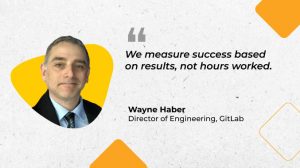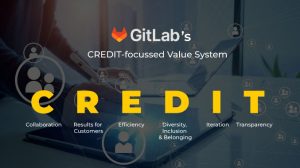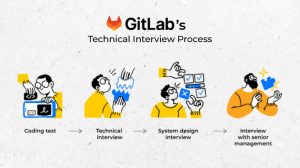Behind the Scenes of GitLab’s Tech Interview Process
- Raunak Jain
- January 15, 2024
- 5 Minute Read

GitLab is the most popular name in the world of developer security operations. Its AI-enabled platform has helped several businesses collaborate, code, test, and deploy their projects within a short time. Their long list of clientele includes big names such as Nvidia, Microsoft, Netflix, PayPal, NASA, and many more.
An important part of GitLab’s success is their working culture and values. They are a fully remote company and a huge advocate of async workforce. They are a people-first organization with a diverse workforce across the globe.
GitLab’s culture and values

The work culture at GitLab is generally described as highly positive and unique, with a strong emphasis on a few key principles:
All-remote: GitLab is fully remote, with employees spread across over 65 countries. This promotes flexibility, inclusion, and access to talent from a global pool. However, it also requires strong asynchronous communication and self-sufficiency skills.
Transparency and open communication: Everything at GitLab is documented and openly accessible, promoting collaboration and mutual understanding. This includes company goals, decision-making processes, and even employee salaries.
Empowerment and ownership: Employees are given a lot of autonomy and responsibility, encouraged to take initiative and ownership of their work. This fosters a sense of purpose and achievement.
Collaboration and team spirit: Despite being remote, GitLab emphasizes teamwork and collaboration. This is facilitated through asynchronous communication tools, virtual team-building activities, and a strong sense of community.
Results-oriented with a growth mindset: While GitLab encourages a healthy work-life balance, it also has a strong focus on achieving results and continuous improvement. Employees are expected to be self-motivated and driven to learn and grow.

Overall, GitLab’s work culture is often praised for its flexibility, transparency, emphasis on individual ownership, and strong team spirit.
Recently, Uplers helped GitLab hire a top talent for their engineering team in just 15 days. As always, GitLab had a clear idea of the kind of talent they wanted – a Senior AppSec Engineer with a rich working experience and expertise in Python / Java / Go / v / JavaScript / C / C++, SAST and DAST tools. Bhavya Kaushal, the first talent they interviewed, impressed GitLab so much that they decided to hire her. She possessed the technical proficiency necessary for the role, took ownership of her tasks and had strong communication skills, making her the ideal fit.
Let us discuss the interview process of GitLab that Bhavya went through before her selection.
Deep Dive Into GitLab’s Interview Process
On 27th September 2023, Uplers spoke to Wayne Haber, the Director of Engineering at GitLab, as a part of its Remote Revolution series. Wayne shared valuable insights into GitLab’s interview process and what they look for in their desired talent.



1. Coding test
In the first round, candidates are sent a coding test based on the programming language relevant to the job role. The test is curated in a way that evaluates the talent’s ability to identify and fix errors. They have two days’ time to finish and submit the test, after which the code is reviewed and judged on parameters like efficiency, accuracy, and merge request standards.
2. Technical interview
Candidates who qualify for the second round have a video conference with the interviewer who reviewed their code. Questions are based on the submitted code, such as “How did you identify the error?”, “Do you think you could have taken a different approach?”, “Why did you choose this specific method?”, etc. During this discussion, the interviewer will closely analyze the talent’s communication skills and reasoning ability.
3. System design interview
This round is focused on fundamentals like performance levels, scalability, multi-tasking, problem solving, etc. The typical “Tell me a time when..” question usually pops up here; this is when the interviewer asks if the candidate has achieved something significant in their role and more details about their journey. The interviewer judges the candidates based on their understanding of the challenge, how they managed the situation, and their humility surrounding the achievement.
4. Interview with senior management
The final two rounds are with the manager of the interviewer and then the hiring manager. At this level, the interviewers are curious about the candidate’s work ethics and if they can align with GitLab’s values. You can expect questions such as “How do you manage your time?”, “How do you ensure clear communication within an asynchronous setup?”, and “Are you self-led or a team player?”.
So How To Prepare For GitLab?
Considering the interview process and the tips shared by Wayne Haber on the Remote Revolution session, you can improve your chances of selection by doing the following:
Read GitLab’s handbook: The handbook is available free of cost, so anyone can download and understand GitLab’s working style and expectations from their employees.
Prepare a detailed and proofread resume: Your resume should be clean, organized, and easy to read. Double check the document to eliminate typos and share your published work, if any.
Sharpen your technical skills: GitLab looks for talents who deeply understand their subject matter and can find innovative solutions. The interview process is geared towards finding someone who has truly mastered their skills and not simply stuck to a set of rules.
Develop soft skills: In an asynchronous work environment like GitLab, it is very important to maintain clear communication and seamlessly collaborate with other team members. The right soft skills will elevate your value addition and help you align with the company’s work style.
Make an account in GitLab: This step will get you important brownie points, as you will be able to talk to the interviewer about your experience in working on their software. Prior knowledge about how GitLab’s software works and your own inputs are sure to impress the interviewer.
Use the STAR method: When you are talking about a problem you solved or a situation that demanded your expertise, remember to use the STAR method – Situation, Task, Action, Result. Organize your storytelling in this manner to create more impact.
Crack The Interview and Get That Dream Job
If you are looking forward to your interview at GitLab or a similar tech company for remote roles, these tips will help you prepare well and get that dream job. Feel free to use this blog as a handy guide and all the best for your next interview!
To get more insights on hiring and interview process at top remote companies, join our discord channel here: https://discord.gg/NMcTASJx
Also Read: Atlassian’s Unique Culture and it’s Hiring Process











